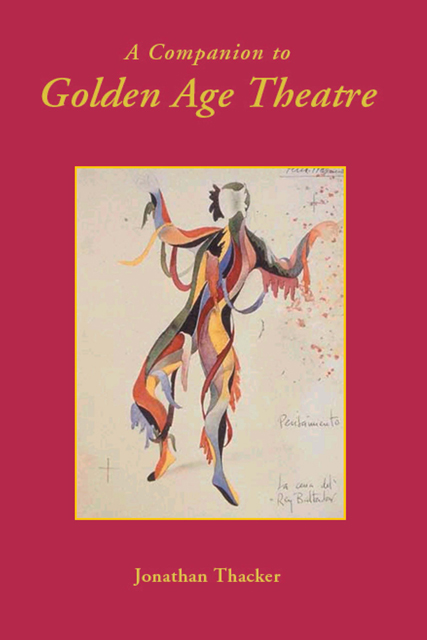Book contents
- Frontmatter
- Contents
- Dedication
- Foreword
- List of Abbreviations
- Introduction
- 1 The Emergence of the Comedia nueva
- 2 Lope de Vega
- 3 Cervantes, Tirso de Molina, and the First Generation
- 4 Calderón and the Comedia's Second Generation
- 5 Staging and Performance
- 6 Types of Comedia and Other Forms of Theatre
- 7 A Brief History of Reception
- Appendix 1 Verse Forms
- Appendix 2 English Translations of Golden Age Plays
- Suggestions for Further Reading
- Bibliography
- Index
7 - A Brief History of Reception
Published online by Cambridge University Press: 09 May 2023
- Frontmatter
- Contents
- Dedication
- Foreword
- List of Abbreviations
- Introduction
- 1 The Emergence of the Comedia nueva
- 2 Lope de Vega
- 3 Cervantes, Tirso de Molina, and the First Generation
- 4 Calderón and the Comedia's Second Generation
- 5 Staging and Performance
- 6 Types of Comedia and Other Forms of Theatre
- 7 A Brief History of Reception
- Appendix 1 Verse Forms
- Appendix 2 English Translations of Golden Age Plays
- Suggestions for Further Reading
- Bibliography
- Index
Summary
The full history of the reception of Spanish Golden Age drama is yet to be written, and there is no space here (nor should there be in a Companion) to attempt to produce one. However, one of the more significant lessons that modern approaches to literature have taught us is that responses to works of art can never be fixed or eternal, and indeed they reveal at least as much about its audience (reader or spectator) as about the art itself. It is worth briefly outlining some of the characteristic and influential reactions to the works of Lope de Vega and his fellows as a curtain-call to this volume. An idea of trends in reception will help to explain the tenor of much scholarly writing on the comedia nueva and thus provide an essential context for further reading on the subject. We shall deal with reactions to performances and to readings of the drama from its inception to the present day.
In its early years and its heyday the comedia nueva attracted criticism on two main fronts: from moralists (mainly churchmen), who were scandalized in part by the inherent dangers of drama itself, and more often by the infectious depravity they saw in the world of the theatre, and from preceptistas, who objected on aesthetic grounds to its crowd-pleasing, unclassical form. The battle between moralists and supporters of the theatre was fought over a long period with its intensity varying in different places and at different times. In some cities, especially in the south of Castile, moralists’ arguments had more success, but overall the closure of the theatres was much more likely to be occasioned by a royal death, as in 1597, 1644 and 1665, than by pressure from the anti-theatre lobby. The lobbying did intensify however, whenever the theatres were closed during a period of royal mourning (see Whicker, The Plays, p. 16). The silencing of Tirso de Molina in the early years of the reign of Philip IV, another time of anxiety about the role of the theatre, is further evidence of the critics’ success (see p. 62). Two of the factors that worked in favour of the theatre were the court's fascination with dramatic performances throughout almost the whole of the Golden Age period, and the dependence of the hospitals on revenue from the corrales.
- Type
- Chapter
- Information
- A Companion to Golden Age Theatre , pp. 170 - 178Publisher: Boydell & BrewerPrint publication year: 2007
- 1
- Cited by



